Похожие презентации:
Подготовка к олимпиадам по английскому языку
1. Готовимся к олимпиадам по английскому языку
2. Основные цели и задачи олимпиады:
•выявление и развитие у учащихсятворческих способностей и интереса к
английскому языку;
•развитие языковых и социокультурных
знаний, связанных с историей и культурой
англоязычных стран.
3.
Олимпиада школьников проводится в несколько этапов:- школьный (для учащихся 5-11 классов),
- муниципальный (для учащихся 7-11 классов),
- региональный (для учащихся 9-11 классов),
- заключительный.
В каждом этапе, начиная с муниципального, принимают
участие школьники, ставшие победителями и призерами в
предыдущем этапе.
4. Муниципальный этап состоит из 4 конкурсов:
•конкурс понимания устной речи;•конкурс понимания письменной
речи;
•лексико-грамматический тест;
•конкурс письменной речи.
5. Конкурс понимания устной речи
• Listen to the text and decide if the statements are true (T) or false (F) orthere is no information about it in the text (NI).
• The man is not convinced about the extent of the problem.
• The two specific regions in the brain are active when people are depressed.
• Optimistic people have more cells in these two regions of the brain.
• Research reveals that one third of the world’s population suffer from
depression at least once in their life.
• Researchers know that inactivity of the two regions of the brain is a cause
of depression.
• Autopsies show that depressed people had various health problems.
6. Конкурс понимания устной речи: альтернативный выбор
• Listen to the text and decide if the statements are true (T) or false (F) or there isno information about it in the text (NI).
• The man is not convinced about the extent of the problem. TRUE
• The two specific regions in the brain are active when people are depressed. NO
INFORMATION
• Optimistic people have more cells in these two regions of the brain. NO
INFORMATION
• Research reveals that one third of the world’s population suffer from depression
at least once in their life. NO INFORMATION
• Researchers know that inactivity of the two regions of the brain is a cause of
depression. FALSE
• Autopsies show that depressed people had various health problems. NO
INFORMATION
7. You will hear a passage about jokes. For items 1-10 decide whether the statements are True (A) or False (B) according to the
text you hear. You will hear the textonce.
1. People from different countries easily agree about what is funny.
2. Some cultures do not have jokes.
3. In many countries there are jokes about stupid persons.
4. Taboo subjects may vary in different countries.
5. The joke about the hunters is a ‘black’ one.
6. The narrator finds the joke about the hunters extremely funny.
7. The scientists think that the joke about Sherlock Holmes and
Dr Watson is the funniest.
8. The narrator rather likes the Sherlock Holmes and Dr Watson
joke.
9. Surprising endings are important for good jokes.
10. Scientists will once be able to find the best ever joke.
8.
1. People from different countries easily agree about what is funny. B2. Some cultures do not have jokes. B
3. In many countries there are jokes about stupid persons. A
4. Taboo subjects may vary in different countries. A
5. The joke about the hunters is a ‘black’ one. A
6. The narrator finds the joke about the hunters extremely funny. B
7. The scientists think that the joke about Sherlock Holmes
and Dr Watson is the funniest. B
8. The narrator rather likes the Sherlock Holmes and Dr Watson joke.A
9. Surprising endings are important for good jokes. A
10. Scientists will once be able to find the best ever joke. B
9. Конкурс понимания устной речи: заполнение пропусков
• Fill in the gaps with no more than two words.Time machine,
Let’s go back in time.
First stop was 1) ____________________
Times of war and times of 2) ____________,
Mathematicians and philosophers,
Socrates and Herodotus.
Next stop was a long way from home,
I was in streets of 3) __________________
The Coliseum in all its glory
The 4) __________________ were another story.
Columbus sailed from East to 5) _______,
6) _________ was born, you know the rest.
I saw the days of the 7) _______________
The guillotine was no solution.
I saw times of darkness and times of light,
Politicians from the left and 8) _______,
World War I and World War II,
An 9) _______________ between me and you.
I saw a man walking up in 10) _______,
The 11) _______________ sink without a trace,
A world of robots and 12) ___________,
What’s the future for you and me?
10.
Time machine,Let’s go back in time.
First stop was 1) Ancient Greece
Times of war and times of 2) peace,
Mathematicians and philosophers,
Socrates and Herodotus.
Next stop was a long way from home,
I was in streets of 3) Ancient Rome
The Coliseum in all its glory
The 4) circus games were another story.
Columbus sailed from East to 5) West,
6) America was born, you know the rest.
I saw the days of the 7) French Revolution
The guillotine was no solution.
I saw times of darkness and times of light,
Politicians from the left and 8) right,
World War I and World War II,
An 9) iron curtain between me and you.
I saw a man walking up in 10) space,
The 11) Berlin Wall sink without a trace,
A world of robots and 12) technology,
What’s the future for you and me?
11. Интегрированное задание: конкурс понимания письменного и устного текстов
For many years, scientists have known that music can help soothe babies. Then theydiscovered that listening to music, Mozart in particular, can help babies in ways they
hadn’t imagined before. The phenomenon, called the Mozart Effect, was found to
have positive benefits on intelligence and creativity.
In one study, psychologists gave study participants three tests. During each of the
tests, the participants of the study listened to either Mozart, relaxation music, or
nothing at all. The results of the study showed that all of the participants scored
better on the tests after listening to Mozart. On average, the participants added about
nine points to their IQ after listening to Mozart.
The Mozart Effect also affects the creativity of babies. In his book, American author
Don Campbell described how playing Mozart for babies before they are born can
help them become more creative as adults. According to Campbell, the music helped
stimulate their mental development. By the time the babies were born, they were
already more creative than babies who did not listen to Mozart. His argument was so
strong that some hospitals decided to give all new mothers CDs of Mozart’s music.
12. Choose A if the idea is expressed in both materials, B if it can be found only in the reading text, C if it can be found only
in the audio-recording, and D if neither of the materials expresses theidea.
Music can calm babies down.
The Mozart Effect has a good impact on children’s intelligence and creativity.
The study involved three tests.
One group of the test-takers did not listen to any music at all.
The test-takers were college students.
A molecular basis for the Mozart Effect has recently been revealed.
The extra nine points, added to the IQs of those who listened to Mozart, disappeared after 15
minutes.
Rats, like humans, perform better on learning and memory tests after listening to a Mozart sonata.
The Mozart Effect has not been proved scientifically.
Don Campbell’s book The Mozart Effect has condensed the world’s research on all beneficial
effects of certain types of music.
Some hospitals gave new mothers CDs of Mozart’s music.
The theory of the Mozart Effect was a marketing tool.
13. Choose A if the idea is expressed in both materials, B if it can be found only in the reading text, C if it can be found only
in the audio-recording, and D ifneither of the materials expresses the idea.
Music can calm babies down. B
The Mozart Effect has a good impact on children’s intelligence and creativity. B
The study involved three tests. A
One group of the test-takers did not listen to any music at all. A
The test-takers were college students. C
A molecular basis for the Mozart Effect has recently been revealed. D
The extra nine points, added to the IQs of those who listened to Mozart, disappeared after 15 minutes. C
Rats, like humans, perform better on learning and memory tests after listening to a Mozart sonata. D
The Mozart Effect has not been proved scientifically. C
Don Campbell’s book The Mozart Effect has condensed the world’s research on all beneficial effects of
certain types of music.D
• Some hospitals gave new mothers CDs of Mozart’s music. B
• The theory of the Mozart Effect was a marketing tool. C
14. Use of English: Verb Forms
Cheryl Kuit pressed play and Latin music filled the room. As Cheryl started practicing her Zumba dance moves, her16-year-old daughter Amber let out a groan.
‘Come on,’ said Cheryl. ‘Don’t you feel like 1) _________________?’
But while her mum boogied across the room, Amber just rolled her eyes and 2) _________ on texting her friends.
Cheryl couldn’t understand it. She’d loved PE at school, enjoyed squash in her 20s and 3) ____________ a dress
size since becoming a Zumba Fitness teacher.
Her seven-year-old Catherine, loved running and gymnastics, but there 4) ______ no way of getting her big sister
5) ______________ some exercise.
Cheryl said, ‘I want to encourage Amber to have a break from her books and computer screen. I’d love her to go to
the gym.’
But Amber said that having piles of homework stopped her from getting fit.
‘I’m at school from 8am to 4pm,’ she explained. ‘Then I come home and do three hours of homework. I just
6) ______________ time for sport.’
She admitted she’d rather spend her free time hanging out with friends – and it was no help that her school didn’t
see PE a priority.
She said, ‘Because we 7) _______ exams now, our year group has just one hour a week for sport. There are clubs
but you have to be the very best to get in. They 8) ___________ just for fun.’
Cheryl, 46, of Dennan Road, Surbiton, Greater London, 9) _____ up hope yet. She thinks everything will be all
right. She says, ‘I’ll be a very happy lady when one day Amber 10) _______, “Come on, Mum. Let’s go Zumba!” ’
DANCE
CARRY
DROP
BE
TAKE
NOT HAVE
DO
NOT BE
NOT GIVE
SAY
15. Use of English: Verb Forms
Cheryl Kuit pressed play and Latin music filled the room. As Cheryl started practicing her Zumba dancemoves, her 16-year-old daughter Amber let out a groan.
‘Come on,’ said Cheryl. ‘Don’t you feel like 1) DANCING?’
But while her mum boogied across the room, Amber just rolled her eyes and 2) CARRIED on texting her
friends.
Cheryl couldn’t understand it. She’d loved PE at school, enjoyed squash in her 20s and 3) HAD DROPPED a
dress size since becoming a Zumba Fitness teacher.
Her seven-year-old Catherine, loved running and gymnastics, but there 4) WAS no way of getting her big
sister
5) TO TAKE some exercise.
Cheryl said, ‘I want to encourage Amber to have a break from her books and computer screen. I’d love her to
go to the gym.’
But Amber said that having piles of homework stopped her from getting fit.
‘I’m at school from 8am to 4pm,’ she explained. ‘Then I come home and do three hours of homework. I just
6) DON’T HAVE time for sport.’
She admitted she’d rather spend her free time hanging out with friends – and it was no help that her school
didn’t see PE a priority.
She said, ‘Because we 7) ARE DOING exams now, our year group has just one hour a week for sport. There are
clubs but you have to be the very best to get in. They 8) AREN’T just for fun.’
Cheryl, 46, of Dennan Road, Surbiton, Greater London, 9) HASN’T GIVEN up hope yet. She thinks everything
will be all right. She says, ‘I’ll be a very happy lady when one day Amber 10) SAYS, “Come on, Mum. Let’s go
Zumba!” ’
DANCE
CARRY
DROP
BE
TAKE
NOT HAVE
DO
NOT BE
NOT GIVE
SAY
16.
Think of one word only which can be used appropriately in all three sentences.1. ● I need more ………………………….…… at using this computer program.
● I am worried about my interview because I’m a bit out of …………..……… .
● The …………..……… of dumping the waste into the river has to be stopped.
2. ● Ann’s teeth were …………….... after she’d worn braces on them for two years.
● James managed to speak with a steady, …….………voice, despite the fact that he was furious
with them.
● Make sure the surface is ……………..….. before you put up the wall paper.
3. ● The ………………..… with him is that he doesn’t have any patience.
● Stella went to a lot of ………………..… to prepare the meal.
● Angela’s had a lot of back ……………..…. lately and will have to have an operation.
4. ● John is very ………………….. with money.
● That’s a …………………. thing to do.
● The ……………….... annual temperature is 25ºC.
5. ● Elizabeth began to ………………….…… the milk into the sauce.
● Ronald was in a deep sleep and didn’t …………………..….. once all night.
● The book seemed to ……………………..….. him profoundly.
17.
Think of one word only which can be used appropriately in all three sentences.1. ● I need more PRACTICE at using this computer program.
● I am worried about my interview because I’m a bit out of PRACTICE.
● The PRACTICE of dumping the waste into the river has to be stopped.
2. ● Ann’s teeth were EVEN after she’d worn braces on them for two years.
● James managed to speak with a steady, EVEN voice, despite the fact that he was furious with them.
● Make sure the surface is EVEN before you put up the wall paper.
3. ● The TROUBLE with him is that he doesn’t have any patience.
● Stella went to a lot of TROUBLE to prepare the meal.
● Angela’s had a lot of back TROUBLE lately and will have to have an operation.
4. ● John is very MEAN with money.
● That’s a MEAN thing to do.
● The MEAN annual temperature is 25ºC.
5. ● Elizabeth began to STIR the milk into the sauce.
● Ronald was in a deep sleep and didn’t STIR once all night.
● The book seemed to STIR him profoundly.
18. CROSSWORD PUZZLE
For questions, 1-7 read the text The Guests. Solve the crosswordpuzzle by replacing the underlined words or word combinations with
their synonyms.
19.
The GuestsA young man and his wife were on a trip to visit his mother. Usually they (1 across) came in time for
supper, but they had had a late start, and now it was getting dark, so they decided to look for a place to stay
overnight and (3 down) go in a car on in the morning.
Just off the road, they saw a small house in the woods. "Maybe they rent rooms," the wife said. So they
stopped to ask. An elderly man and woman came to the door. They didn't rent rooms, they said, but they
would be glad to have them stay overnight as their guests. They had plenty of room, and they would enjoy the
company. The old woman made coffee and brought out some cake, and the four of them talked for a while.
Then the young couple were taken to their room. They tried to (2 across) beg urgently on paying for this, but
the old man said he would not (6 across) take any money.
The young couple got up early the next morning, before their hosts had awakened. They left an envelope
with some money in it on a table near the front door, to pay for the room. Then they went on to the next town.
They stopped at a (4 down) an eating house and had breakfast. When they told the owner where they had
stayed, he was (5 down) struck with fear. «That can't be,“ he said. "That house burned to the ground, and
the man and the woman who lived there (7 across) passed away in the fire» .
The young couple could not believe it. So they went back to the house. Only now there was no house. All
they found was a burnt-out shell. They stood staring at the ruins trying to understand what had happened.
Then the woman screamed: In the rubble was a badly burned table, like the one they had seen by the front
door and on the table was the envelope they had left that very morning.
20.
41
3
2
5
6
7
21.
A young man and his wife were on a trip to visit his mother. Usually they (1 across) ARRIVED in time forsupper, but they had had a late start, and now it was getting dark, so they decided to look for a place to stay
overnight and (3 down) DRIVE on in the morning.
Just off the road, they saw a small house in the woods. "Maybe they rent rooms," the wife said. So they stopped
to ask. An elderly man and woman came to the door. They didn't rent rooms, they said, but they would be glad to
have them stay overnight as their guests. They had plenty of room, and they would enjoy the company. The old
woman made coffee and brought out some cake, and the four of them talked for a while. Then the young couple
were taken to their room. They tried to (2 across) INSIST on paying for this, but the old man said he would not (6
across) ACCEPT any money.
The young couple got up early the next morning, before their hosts had awakened. They left an envelope with
some money in it on a table near the front door, to pay for the room. Then they went on to the next town. They
stopped at a (4 down) RESTAURANT and had breakfast. When they told the owner where they had stayed, he
was (5 down) SHOCKED. «That can't be,"he said. "That house burned to the ground, and the man and the woman
who lived there (7 across) DIED in the fire» .
The young couple could not believe it. So they went back to the house. Only now there was no house. All they
found was a burnt-out shell. They stood staring at the ruins trying to understand what had happened. Then the
woman screamed: In the rubble was a badly burned table, like the one they had seen by the front door and on the
table was the envelope they had left that very morning.
22. In each of the following extracts from a newspaper there is a misprint. Find this word, underline it and write it correctly.
• In this restaurant you will find a full range of beers,wines and spirits and I would recommend you to try
one of their nasty bar snacks.
• The police would like to trade the man who helped the
old lady after an accident.
• When the police officers arrived on the scene of the
crime, they found a man writing in pain.
• The sign says the land is in conversation area, so it
cannot be touched.
• Jason was stopped by the police who gave him a breast
test.
23. In each of the following extracts from a newspaper there is a misprint. Find this word, underline it and write it correctly.
• In this restaurant you will find a full range of beers, wines andspirits and I would recommend you to try one of their TASTY
bar snacks.
• The police would like to TRACE the man who helped the old
lady after an accident.
• When the police officers arrived on the scene of the crime,
they found a man WRITHING in pain.
• The sign says the land is in CONSERVATION area, so it
cannot be touched.
• Jason was stopped by the police who gave him a BREATH
test.
24. Replace the words in bold type in the following sentences with a simple word. The first letter of the word is given.
• After months of negotiations, the treaty has now beenformally accepted. (r……………………..)
• After all the nuclear tests, the island was not fit to live on.
(u…………………………….)
• We were all informed of the decision in advance.
(b…………………………..)
• The two roads cross each other here. (i……………………………)
• All rooms must be left empty before 12 noon.
(v……………………………..)
25. Replace the words in bold type in the following sentences with a simple word. The first letter of the word is given.
• After months of negotiations, the treaty has now beenRATIFIED.
• After all the nuclear tests, the island was
UNINHABITABLE.
• We were all informed of the decision BEFOREHAND.
• The two roads INTERSECT here.
• All rooms must be VACATED before 12 noon.
26. Proverbs. Fill in the gaps with one word.
1. The early bird catches the ___________.2. Too many cooks spoil the ___________ .
3. Every __________ has a silver lining.
4. Better die standing than live ____________.
5. When at Rome, do as the ___________ do.
6. Where there is a ___________, there is a way.
7. A watched pot never __________ .
8. ___________ is the best policy.
9. One good turn ____________ another.
10.Talk of the ____________ and he will appear.
27.
1.The early bird catches the WORM.2.Too many cooks spoil the BROTH.
3.Every CLOUD has a silver lining.
4.Better die standing than live KNEELING.
5.When at Rome, do as the ROMANS do.
6.Where there is a WILL, there is a way.
7.A watched pot never BOILS.
8. HONESTY is the best policy.
9.One good turn DESERVES another.
10.Talk of the DEVIL and he will appear.
28. IDIOMS. Complete each sentence with the correct colour: green, white, blue, red, golden, black, silver.
• Jonathan was born with a ________ spoon in his mouth – he’s always been rich andsuccessful.
• I don’t usually travel long distances, just once in a _______ moon.
• The company’s managing director received a £900,000 ____ handshake on retiring.
• The new mixer that Stella bought seems to be a ______ elephant — she doesn’t use
it at all.
• Our small firm was in the _____ at the end of our first year. We had really hard times,
I hate it.
• I can proudly say that I managed to move the company into the ______.
• Jackie’s new car made her friends _________ with envy.
• We told the hostess that her fishes were delicious, which was actually a _____ lie.
• I got an e-mail from my school friend out of the _______ last week.
• When the president comes to town the local authorities roll out the ______ carpet.
29.
1. Jonathan was born with a SILVER spoon in his mouth – he’s always been rich andsuccessful.
2. I don’t usually travel long distances, just once in a BLUE moon.
3. The company’s managing director received a £900,000 GOLDEN handshake on
retiring.
4. The new mixer that Stella bought seems to be a WHITE elephant — she doesn’t
use it at all.
5. Our small firm was in the RED at the end of our first year. We had really hard
times, I hate it.
6. I can proudly say that I managed to move the company into the BLACK.
7. Jackie’s new car made her friends GREEN with envy.
8. We told the hostess that her fishes were delicious, which was actually a WHITE
lie.
9. I got an e-mail from my school friend out of the BLUE last week.
10.When the president comes to town the local authorities roll out the RED carpet.
30. POLITENESS STRATEGIES. Match the questions to the functions.
№Question
№
Function
1
Could you type these letters for me?
A
Introduction
2
Why don’t you buy this hat? It’ll match your coat.
B
Suggestion
3
Could I use your mobile phone?
C
Offer
4
You haven’t met my best friend William, have you?
D
Invitation
5
Won’t it be better for us to discuss it now?
E
Request
6
Isn’t the dress old-fashioned?
F
Threat
7
Could he really have failed the exam?
G
Advice
8
Could I see your passport?
H
Asking for permission
9
Shall we dance?
I
Criticism
10
Could I carry your bag, madam?
J
Surprise
K
Order
31.
№Question
№
Function
1
Could you type these letters for me?
E
REQUEST
2
Why don’t you buy this hat? It’ll match your coat.
G
ADVICE
3
Could I use your mobile phone?
H
ASKING FOR PERMISSION
4
You haven’t met my best friend William, have you?
A
INTRODUCTION
5
Won’t it be better for us to discuss it now?
B
SUGGESTION
6
Isn’t the dress old-fashioned?
I
CRITICISM
7
Could he really have failed the exam?
J
SURPRISE
8
Could I see your passport?
K
ORDER
9
Shall we dance?
D
INVITATION
10
Could I carry your bag, madam?
C
OFFER
32. Phrasal verbs.
Replace the words and phrases in bold with the correct forms of the phrasal verbs, usesome other words where it is necessary.
• The meeting continued until 6 p.m.
• Stephen doesn’t have a good relationship with his chief.
• The film was boring. I fell asleep in the middle of it.
• A bomb exploded in one of the residential areas, but fortunately nobody was injured.
• They really charged too much at that hotel. It’s a disgrace to have to pay so much money
for such poor service!
• They had to cancel the football match because of the weather.
• The teacher spoke angrily to him for not doing his homework.
• I wish you would stop trying to impress people – we all know how clever you are!
• We’ve invited them to dinner, but we’ll have to move it to a later date because our baby
is sick.
• We start our journey very early.
33.
1. The meeting continued until 6 p.m. WENT ON2. Stephen doesn’t have a good relationship with his chief. DOESN’T GET ON
3. The film was boring. I fell asleep in the middle of it. DROPPED OFF / NODDED
OFF / DOZED OFF
4. A bomb exploded in one of the residential areas, but fortunately nobody was
injured. WENT OFF
5. They really charged too much at that hotel. It’s a disgrace to have to pay so much
money for such poor service! RIPPED US OFF
6. They had to cancel the football match because of the weather. CALL OFF
7. The teacher spoke angrily to him for not doing his homework. TOLD HIM OFF
8. I wish you would stop trying to impress people – we all know how clever you
are! SHOWING OFF
9. We’ve invited them to dinner, but we’ll have to move it to a later date because
our baby is sick. PUT IT OFF
10.We start our journey very early. SET OFF
34. Vocabulary work.
Name the flowers in the pictures below.1
2
3
4
5
6
7
8
9
35. heather
36. daisy
37. pansy
38. dandelion
39. forget-me-not
40. daffodil
41. tulip
42. lily of the valley
43. snowdrop
44. History and Culture of the English Speaking Countries
1. An important document in British history which King John of England signed in 1215.A) Constitution
B) Magna Carta
C) Bill of Rights
2. The capital of Wales is …
A) Edinburgh
B) Belfast
C) Cardiff
3. The Great Plague was in London in …
A) 1665
B) 1545
C) 1598
4. A district of London, the centre of night clubs, casinos and restaurants.
A) West End
B) Soho
C) the Old City
45. History and Culture of the English Speaking Countries
1. An important document in British history which King John of England signed in 1215.A) Constitution
B) Magna Carta
C) Bill of Rights
2. The capital of Wales is …
A) Edinburgh
B) Belfast
C) Cardiff
3. The Great Plague was in London in …
A) 1665
B) 1545
C) 1598
4. A district of London, the centre of night clubs, casinos and restaurants.
A) West End
B) Soho
C) the Old City
46. WRITING: The line graph shows Minnesota’s investment in child care between 2001 and 2019. Write a report for a university
lecturer describing the information shown.Write at least 150 words.
47. Useful Language
Useful LanguageThis line graph shows changes in …
Total funding started at $120 million.
Total funding reached a peak …
State funding increased for …years and then levelled off.
State funding dipped briefly in 2006, then recovered.
In … total funding stood at …
State funding rose from … to … between … and …
Since 2014 total funding has increased …
It remained constant/stable …
It maintained the same level …
There has been a steady rise in …
There was a dramatic improvement in …
There was a steady growth …
The main trend seen in the graph is that …
48. The bar chart gives information about the unemployment rate in the United Kingdom from July 2015 to April 2016 in per cent.
Write a report for a university lecturer describing the information shown.Write at least 150 words.
49. Useful Language
• The unemployment rate in the United Kingdom fell to …• It is the lowest figure …/It is the highest figure …
• The number of unemployed reached the lowest …
• The employment rate decreased to a fresh record of …
• British unemployment rate was recorded at … per cent …
• The number of unemployed people remained unchanged …
• It fell slightly …
• The figures indicate that …
• The following conclusions can be drawn from the data …
50. The pie chart shows the number of US retail sales in per cent in April 2016. Write a report for a university lecturer
describing the information shown. Write at least 150words.
51. Useful Language
• We can see that the greatest proportion of expenditure was on …• Gasoline accounts for just 7 % of the total.
• Restaurants and bars came in the second place at 12 %.
• Another major expense was general merchandise, at 12 %.
• Compared with …
• In contrast, we can see that …
• The smallest proportion of expenditure was on …
• Overall, the data indicates that …
52. Рекомендации по развитию навыков письменной речи
• Всегда помните высказывание: “The only way to learn to write is towrite.” (Peggy Teeters, American writer, teacher of creative writing)
• Научитесь правильно использовать связующие элементы.
• Изучите орфографические правила. When our spelling is perfect, it’s
invisible. But when it’s flawed, it prompts strong negative associations
(Marilyn vos Savant, American writer).
• Научитесь правильно использовать пунктуационные знаки. Помните,
что пунктуация в английском языке отличается от пунктуации русского
языка.
• Всегда приветствуется оригинальность и творческий подход к
выполнению заданий, однако, помните и о соблюдении заданного
формата письма.
53.
Write your own version of the story based on the picture.Time: 60 minutes
Remember to:
- include a title;
- describe events in an entertaining way;
- include elements of direct speech, description of feelings
and emotions;
- make an unexpected ending.
You should write 220-250 words.
54.
55.
56. Требования, предъявляемые к рассказу
• целостность содержания;• оригинальный, динамически развивающийся сюжет;
• естественность тона повествования, наличие описания, повествования,
рассуждения;
• заинтересованный тон изложения, наличие индивидуально-авторской
оценки событий и фактов, чувств и эмоций автора и героев;
• ясное, логичное изложение мыслей;
• наличие элементов диалогической речи;
• наличие композиции: зачина, основной части с кульминацией,
завершающей части (концовки, развязки);
• наличие заголовка и абзацев4
• использование разнообразных языковых средств.
57. Общие советы
Помните, что рассказ может бытьнаписан от первого или третьего лица,
он может описывать серию
вымышленных событий, событий,
представленных на картинке или
событий из жизни автора.
58.
Рассказ обычно состоит из• введения (зачина), в котором представлена сцена
событий (герои, время, место) таким образом, чтобы
захватить внимание читателя и заставить его продолжить
чтение;
• основной части, в которой разворачивается сюжет и
достигает кульминации;
• заключения (концовки, развязки), в которой автор или
герой обращается к чувствам читателя, комментирует
чувства героев или последствия событий. Чем более
непредсказуема концовка, тем большее впечатление она
произведет на читателя.
59.
•Следует следить за логикойповествования и делить текст на абзацы,
используя средства логической связи.
•Прежде чем начинать писать рассказ,
продумайте сюжетную линию,
характеристику героев, составьте план и
набросайте ключевые слова к пунктам
плана.
60.
Можно начать рассказ•описывая погоду, людей, место
действия;
•используя прямую речь;
•задавая риторический вопрос;
•адресовав свои слова к читателю.
61. Можно закончить рассказ
• обращаясь к чувствам читателя;• описывая реакции людей на события, описанные в основной
части;
• создавая загадку или напряжение;
• раскрывая загадку или снимая напряжение;
• объясняя последствия событий, давая развязку;
• задавая риторический вопрос;
• написав о чем-то абсолютно неожиданном в плане предсказания
развития сюжета.
62.
• Учтите, что динамика событий в рассказеочень важна, ее можно подчеркнуть,
• используя слова at the beginning, at first, then,
before, until, while, during, after, after a while,
finally, eventually, etc.,
• также используя глаголы happen, decide,
realise, start, run, appear, disappear, occur,
exclaim, sigh, mutter, say, wonder, surprise,
believe, argue, etc.
63.
•Используйте прилагательные инаречия, чтобы описать чувства и
действия героев. При этом вместо
приевшихся слов big, small, interesting,
good, bad, very используйте их
синонимы enormous, tiny, exciting,
terrific, horrible, extremely etc.
64.
При написании рассказа используйте самые разнообразныеграмматические структуры: Complex Object, Conditionals, Inversion
etc.
• Используйте Past Continuous для описания ситуации, на фоне
которой происходят основные события (The sun was shining, the
birds were twittering, the children were playing in the yard).
• Используйте Past Simple для описания основных событий, цепочки
действий (He slowly entered the house, locked the door and looked at
the clock on the wall).
• Используйте Past Perfect для событий, происходивших до основных
событий (The house was empty as everybody had gone to the
concert).
65. Adding -ed to the verb stem.
If a verb ends in -y which is preceded by a consonant, -y changes into -i + -ed (study –studied, deny – denied, cry – cried). If -y at the end of the verb is preceded by a vowel, there is
no change (stay – stayed, play – played).
● A final consonant is doubled if it is preceded by one short stressed vowel (stop – stopped,
drop – dropped, permit – permitted, admit – admitted) or if a verb ends in a stressed -ur, -ir or
-er (prefer – preferred, occur – occurred, refer – referred, stir – stirred). There are some
exceptions, though: kidnap – kidnapped, worship – worshipped, handicap – handicapped. If a
long or unstressed vowel precedes the final consonant, the latter is not doubled (steam –
steamed, reform – reformed, limit – limited, appear – appeared).
● A final -l is doubled in all the cases (travel – travelled, quarrel – quarrelled).
● Final vowel letters and combinations -ow, -aw, -ew do not change (taxi – taxied, ski – skied,
veto – vetoed, moo – mooed, show – showed, thaw – thawed, sew – sewed).
● If a verb ends in -ee, only -d is added (agree – agreed).
● If a verb ends in -c (usually -ic) which is pronounced as [k], the letter c changes into ck to
keep the sound [k] (panic – panicked, picnic – picnicked).
66. Adding -(e)s to the verb stem.
● If a verb ends in -s, -ss, -sh, -ch, -tch, -x, -z, -o, thesuffix -es is added to the verb to form the Present
Simple Tense (gasses, passes, washes, launches,
watches, fixes, buzzes, does).
● If a verb ends in -y which is preceded by a consonant,
-y changes into -i + ed (carry – carries, try – tries, study
– studies), if the final -y is preceded by a vowel, no
change takes place (obey – obeys, stay – stays).
67. Adding -ing to the verb stem.
● If a verb ends in a silent -e, it is dropped when -ing is added (admire –admiring, charge – charging). There are some exceptions: dye – dyeing, toe –
toeing, singe – singeing.
● A final consonant is doubled if it is preceded by a short stressed vowel (stop
– stopping, cut – cutting) or if a verb ends in –ur, -ir or -er (prefer –
preferring, occur – occurring, stir -stirring). There are some exceptions:
kidnap – kidnapping, worship – worshipping, handicap – handicapping.
● A final -l is always doubled (travel – travelling, quarrel – quarrelling).
● If a verb ends in -y, -y remains unchanged in all positions (study – studying,
play – playing, cry – crying).
● A final -ie changes into -y (die – dying, tie – tying, lie – lying).
● If a verb ends in -c (usually -ic) which is pronounced as [k], the letter c
changes into ck to keep the sound [k] (traffic – trafficking, picnic –
picnicking).
68. Add -es to the following verbs.
itchkiss
avoid
buy
laugh
lay
occupy
preach
choose
miss
lie
approach
base
catch
clench
endure
apply
annoy
appear
arch
bore
develop
draw
empty
employ
enjoy
go
identify
owe
cancel
dry
dress
69.
itcheskisses
avoids
buys
laughs
lays
occupies
preaches
chooses
misses
lies
approaches
bases
catches
clenches
endures
applies
annoys
appears
arches
bores
develops
draws
empties
employs
enjoys
goes
identifies
owes
cancels
dries
dresses
70. Add -ed to the following verbs.
replycover
mimic
handicap
sew
rob
bury
employ
prefer
carry
stir
kidnap
betray
allow
radio
agree
cancel
worry
heal
worship
quarel
taxi
traffic
exit
beg
hum
refer
repair
roar
occur
show
free
pit
regret
destroy
study
71.
repliedcovered
mimicked
handicapped
sewed
robbed
buried
employed
preferred
carried
stirred
kidnapped
betrayed
allowed
radioed
agreed
cancelled
worried
healed
worshipped
quarreled
taxied
trafficked
exited
begged
hummed
referred
repaired
roared
occurred
showed
freed
pitted
regretted
destroyed
studied
72. Add -ing to the following verbs.
travelcare
cancel
judge
breathe
argue
toe
buy
bury
die
sue
dye
agree
rub
permit
stay
study
allow
delay
tie
issue
see
panic
enjoy
worship
regret
exit
cool
ski
fry
singe
mimic
rob
worry
complain
kidnap
visit
offer
signify
lie
73.
travellingcaring
cancelling
judging
breathing
arguing
toeing
buying
burying
dying
suing
dyeing
agreeing
rubbing
permitting
staying
studying
allowing
delaying
tying
issuing
seeing
panicking
enjoying
worshipping
regretting
exiting
cooling
skiing
frying
singeing
mimicking
robbing
worrying
complaining
kidnapping
visiting
offering
signifying
lying
74. Рекомендации по подготовке к муниципальному этапу олимпиады
• расширение словарного запаса• повторение грамматического материала
• чтение художественной литературы
• выполнение различных письменных заданий
• прослушивание текстов, песен, радиопрограмм
• просмотр художественных фильмов, сериалов, документальных
фильмов, обучающих фильмов, коротких видеороликов
• выполнение самых разнообразных заданий на развитие навыков
устной речи
75. Рекомендации по развитию навыков устной речи
• выполнение заданий разного типа (монологи, диалоги, полилоги,презентации);
• запись ответов на диктофон (или работа с программой What’s app);
• выполнение заданий с предварительной подготовкой (в том числе
домашней);
• выполнение заданий с минимальной подготовкой;
• работа в группах (выполнение проектов; заданий, которые носят
проблемный характер);
• оценивание устных высказываний других учащихся (развивает умение
замечать ошибки, исправлять их, анализировать причины
возникновения, стараться избегать подобных ошибок в своих
высказываниях)
76. Составление презентации
Task 1. Look at the storyboard for Marli fruit juice and prepare ascenario (a story that summarises the action, the atmosphere, the
characters and the scene where the sequences of the TV commercial
will be filmed) and a slogan for this product. Give a two-minute
presentation of your scenario.
Remember to speak about:
● the setting;
● the characters;
● the action;
● the slogan.
77.
78.
Task 1. Before you start doing the task, read some information about designing atelevision commercial.
A TV commercial is a short film sequence of between 30 and 60 seconds with an
accompanying soundtrack. Various techniques are used in commercials to convince the
viewer of the value of the product or service which is being advertised. One of the
most common is ‘dramatization’ where a short story is developed around the product
or the service. The original ideas behind a commercial of this type are developed from
a scenario, a written document that summarises the action, the atmosphere, the
characters and the scene where the sequences of the commercial will be filmed. An
artist then produces a storyboard, or series of pictures, to show how the commercial
will look.
Look at the storyboard for a Gillette anti-perspirant TV commercial and prepare a
scenario and a slogan for this product. Present your scenario to the teacher. You are
to talk for 1-1,5 min. The teacher will listen until you have finished. Then s/he will
ask you some questions.
Remember to speak about:
● the setting;
● the characters (explain who they are; what they look like; what they say);
● the action;
● the slogan.
79.
80.
Imagine that you and your partner are invited to a talk showabout modern technologies. Present a true-to-life or an
imaginary story about how a hero’s incompetence with new
technologies puts him in danger.
(Monologue; Time: 1-1,5 minutes)
Then answer three questions of your partner.
(Dialogue; Time: 2 minutes)
81. Telling a story
Make up either an imaginary or a true-to-lifestory and present it to your partner. Your
partner will listen to you until you have
finished and then s/he will ask you 3
questions. After that the partner must say if
the story is true or imaginary.
82. Speaking based on the video episode
Watch a short video episode about Sydney and dothe following tasks:
• speak about the good and bad points of the
transportation in Sydney;
• say how the transportation in your hometown
can be improved.
83. Speaking based on a picture
Design a robot of your own. Draw a picture and prepare apresentation in which you are to
• describe a robot;
• speak about its functions;
• explain in what spheres (education, work, entertainment,
home, travel, medicine, space exploration etc.) it can be
useful.
You are to speak for about 2 minutes. The jury will listen to
you until you have finished. Then you will be asked some
questions.
84. Dialogue with a partner
Talk with your partner about the degree of danger each of the followingprofessionals might face in their jobs. Then decide on the job that is most
dangerous.
Remember to:
● speak for 3-4 minutes;
● discuss all the pictures;
● come up with ideas and give good reasons;
● find out your friend’s attitudes and take them into account;
● be active and polite;
● use conversational formulas;
● come to an agreement and choose only one profession which you find the
most dangerous.
85.
Talk with your partner about the degree of danger each of the followingprofessionals might face in their jobs. Then decide on the job that is most dangerous.
When you finish your conversation, you will be asked some questions.
86.
Presentation based on some information inthe Russian language
Imagine you are a tourist guide and you are going to tell a foreign tourist
from the USA about the monument to V.M. Shukshin.
Remember to speak about
● the person whose monument you are standing in front of;
● the history of the construction;
● the significance of the monument.
Present the facts in an entertaining way. You have 15 minutes to look
through the information for your excursion and 3 minutes for the
presentation.
87.
88.
89.
Game Foodstart
special features of
Russian cuisine
your weekend menu
your weekday menu
your favourite dish
an exotic dish
your first experience
in cooking
your favourite fruit
and vegetables
the diet you remember
the worst dish you’ve
ever tried
traditional dishes of
various countries
cooking food for a
home party
the most important
thing when cooking
unhealthy food which
you really like
the worst cooking
experience
your favourite drink
the worst party
you remember
the best party
you remember
the best place
for eating out
the worst place for
eating out
your family’s
favourite dish
finish
90. Типичные грамматические ошибки
• времена,• использование глагольных форм,
• согласование времен,
• порядок слов,
• артикли,
• употребление множественного числа в структуре: one
of the cities,
• предлоги: influence smth, his influence on me, affect smth
• местоимения (feel happy).
91. Лексические ошибки
• лексическая сочетаемость,• идиомы,
• фразовые глаголы
• слова, представляющие особую сложность: loseloose; lie-lay, rise-raise, invite-invent
• ложные друзья переводчика: intelligent, accurate,
• неправильное словообразование: architect,
playwright
92. Орфографические ошибки
•правила написания слов при добавлениисуффиксов -ing, -ed, -es: -y в финальной
позиции, удвоение согласной и др.
•cуффикс –ful,
•написание отдельных слов: disappointing,
convenient, until.
93. Пунктуационные ошибки
• использование правил русского языка (запятая передthat),
• оформление прямой речи,
• использование кавычек для названий книг, фильмов и
др.,
• использование строчных букв в названиях,
• использование точки в конце заголовков,
• отсутствие запятой после вводных слов.
94. Прямая речь
‘Daddy, when you were my age, how much television could you watch?’Paula glanced at Bob seductively.
‘When I was your age, there was no TV.’
‘Are you that old?’
‘What your father means,’ said Sheila, glossing Bob’s hyperbole, ‘was
he knew that reading books was more rewarding.’
‘We read books in school,’ said Paula. ‘Can I watch the tube now?’
‘If all your homework is done,’ said Sheila.
95. Стилевые ошибки
использование разговорной лексики всочинениях, докладах, описаниях, стиль
которых должен соответствовать
нейтральному или официальному.
96. Фонетические ошибки
• неверное произношение слов (channel – canal, desert-dessert, Seoul, image,design, extreme, effect, company, win-won-won, front, discount, climb, bomb,
comb, nation – national, international, nature – natural, says-said, house-houses,
secretive, biscuits, astronaut),
• произнесение звука [g] в конце слов –ing,
• межзубных звуков [θ, ð],
• замена одного из звуков другим [w, v, f, θ, ð],
• неверное ударение в словах: communicate, imaginative, investigate, mobile
• ударение сложных существительных (wildlife, bedroom, handbag, newspaper,
homework, timetable, vacuum-cleaner),
• интонация (паузация, логическое ударение, выделение всех слов синтагмы,
несоблюдение интонации конца предложения и др.),
• долгота: beach, reach, speak, people
• диссимиляция: hundred, particularly, regularly, conscientious, tragedy
(*tradegy), subtract (*substract)
97.
СПАСИБОЗА ВНИМАНИЕ!




















































































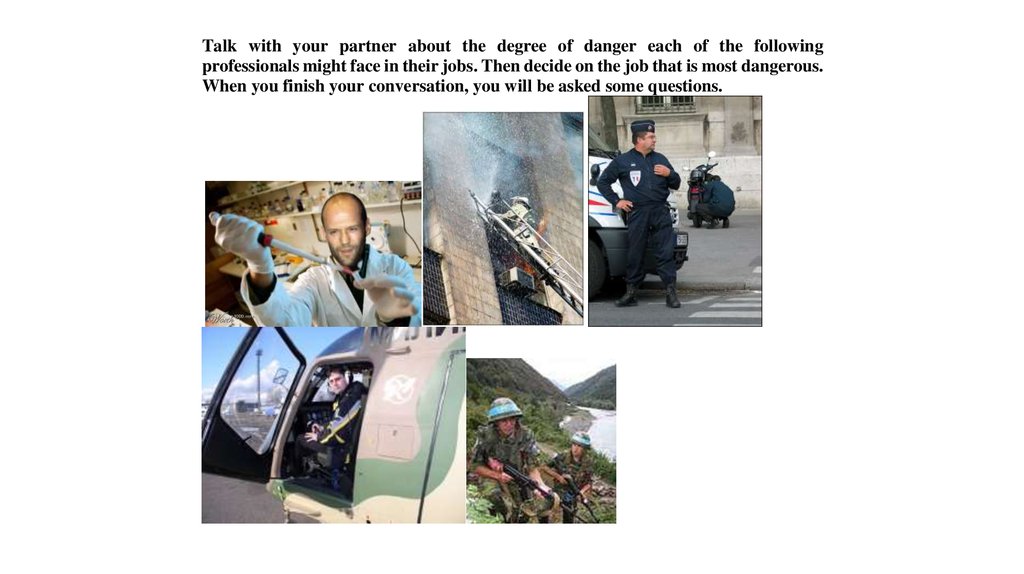

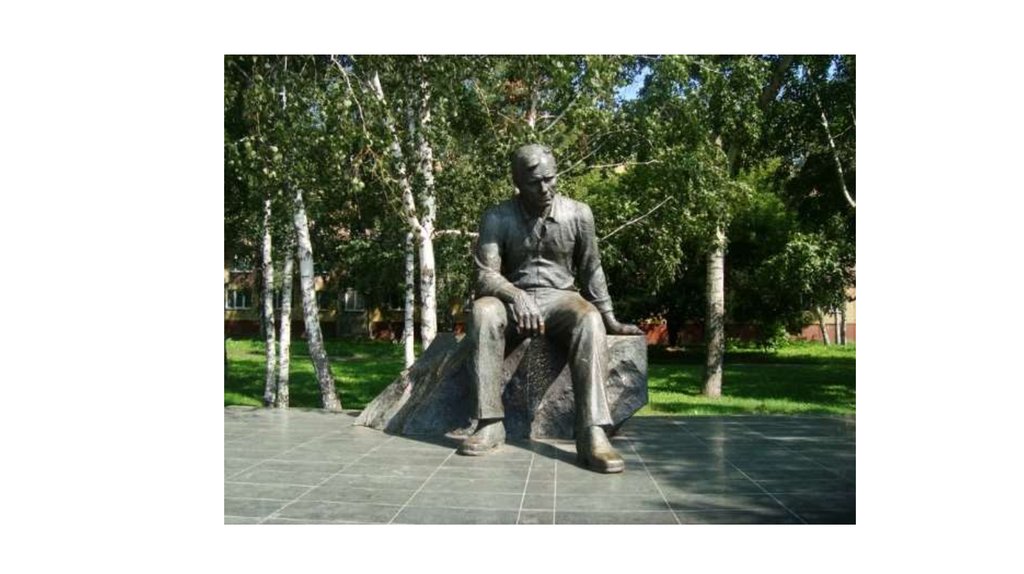


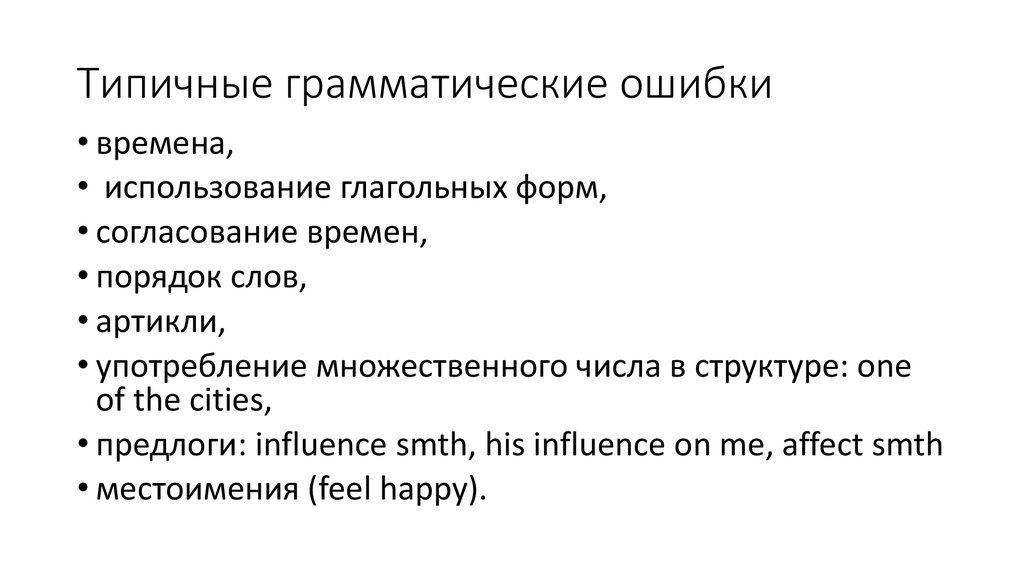
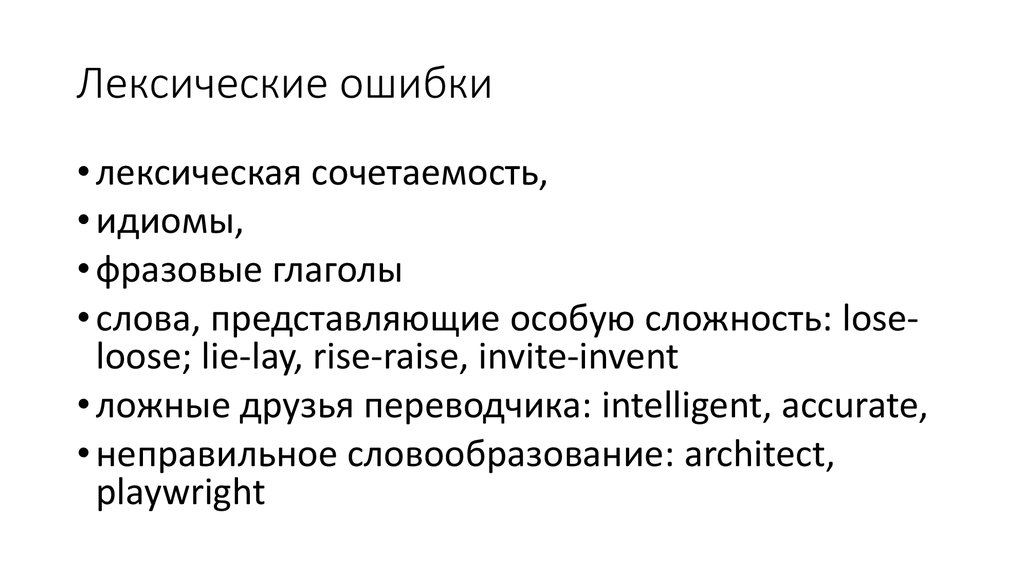
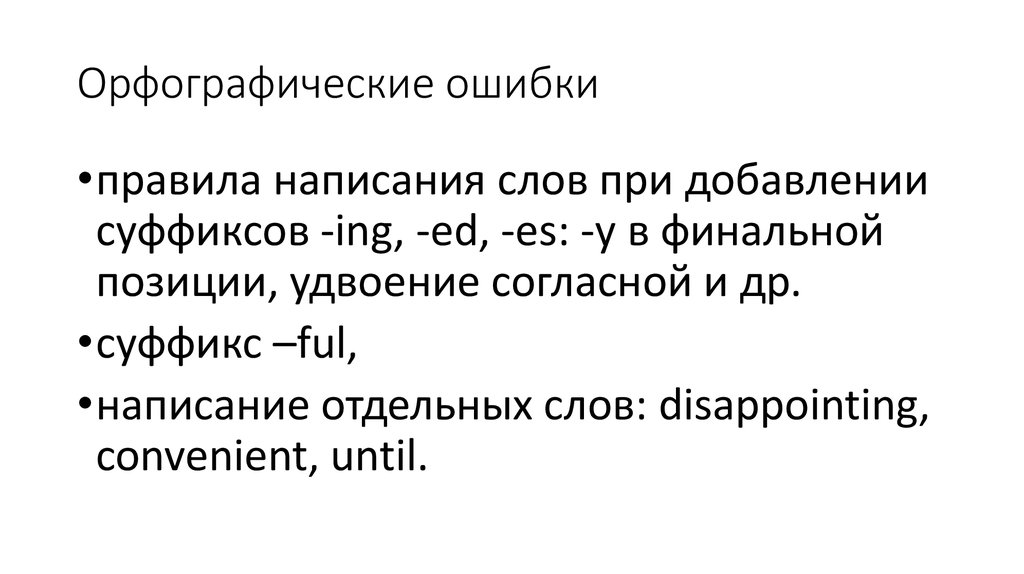
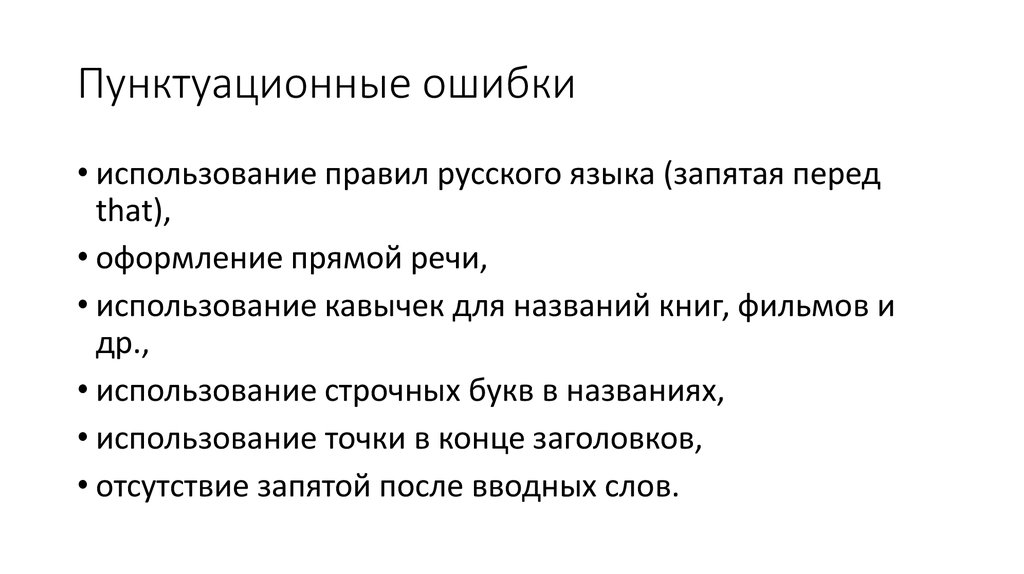
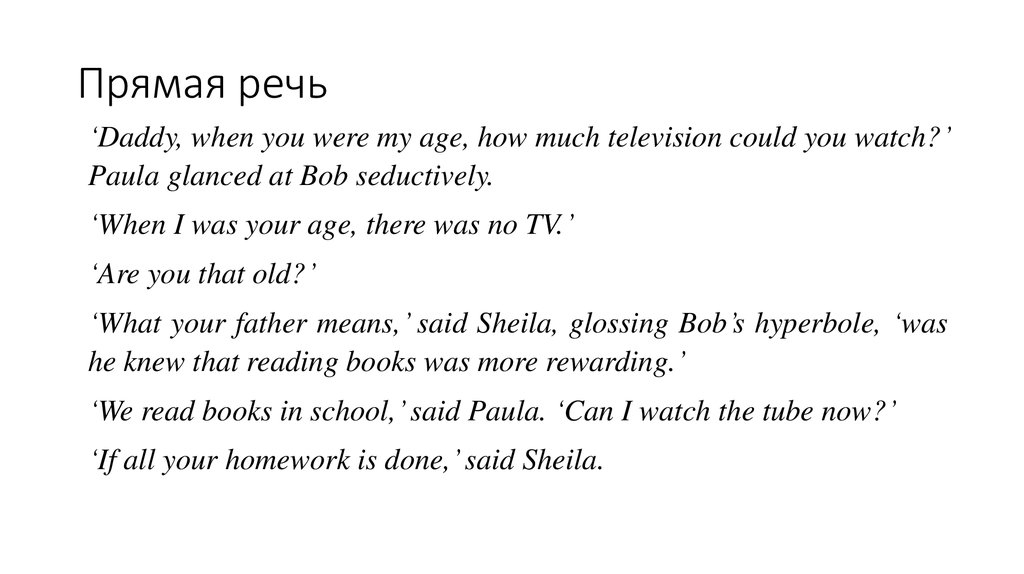

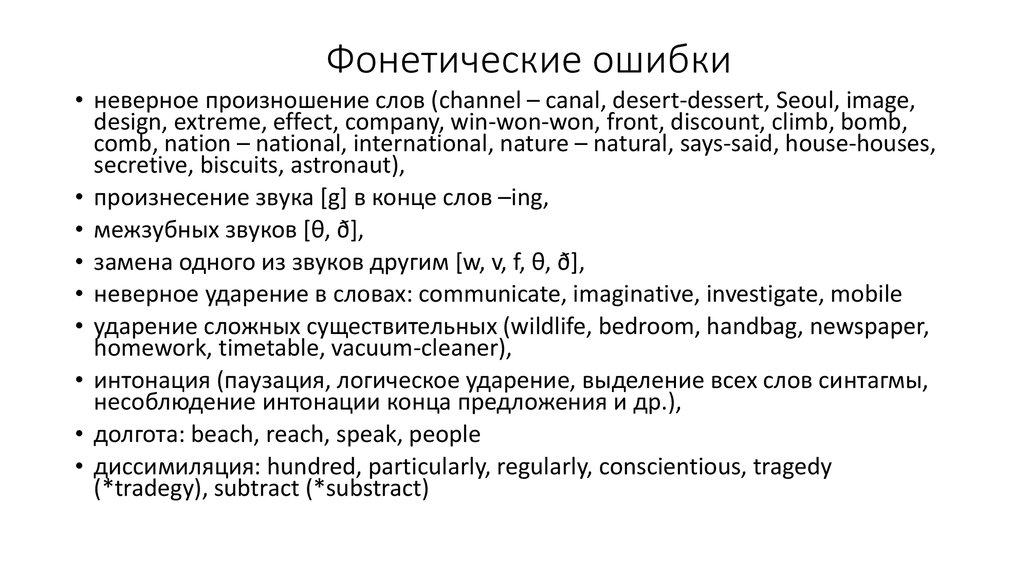

 Английский язык
Английский язык








